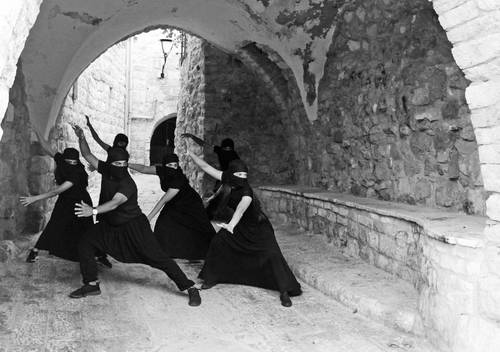Mexican led performance based on the words of Palestinian poets to the West Bank
The Mexican playwright Ángel Hernández developed in the West Bank community of Beit Jala a performance based on the words of Palestinian poets and the inalienable discourse of resistance
of that town. It is part of the artistic project Dakhla, that investigates the idea of the earth as origin and alternative of return.
The artistic action took place a few days ago, although it was originally planned for October 7, in commemoration of the start of the war in the Gaza Strip, but it was postponed due to the risk of publicly exposing an alternative discourse to that of the military regime Israeli, the theater researcher explained to The Day.
The initiative Dakhla (an Arabic word that refers to the interior) began last year on the Egyptian border in the Sinai area, where it gathered testimonies from volunteers, activists and families who managed to escape the first bombings in Gaza.
The work continued in a Palestinian refugee camp on the outskirts of Amman, the Jordanian capital, through writings that expand and relate to Palestinians who cannot return to their country or to people who were born in Jordan and continue to consider that they were born in Palestine. We try to question the figure of the earth as origin, provenance and alternative return
Hernandez said.
The investigation continued in the West Bank three months ago, where it arrived at “a poetic dimension in relation to the search for forgotten, lost or burned texts by the Israeli occupation, of poets who have been resisting imprisonment, persecution, most of them in the exile and others living in Palestinian territory.
We asked ourselves what was left after the disappearance of those writings, and we had the opportunity to work with two poets, one in exile and another who lives in the city of Nablus: Saed Abu-Hijleh and Sami Al-Kilani.
Both creators have participated in colloquiums at the National Autonomous University of Mexico. They were imprisoned in Al Fara prison, where they generated memories about the texts forgotten and denied by the occupation, and about being prisoners for more than 10 years.
Ángel Hernández said that they named a magazine Al Fara to distribute the voice of these and other poets who join refugee camps in the northern West Bank, mainly those of Nablus, Balata, Tulkarem, Jenin and Tubas
.
The publication explores whether Poetry is in a position to save something, to allow something to continue happening, like life, if it is an instrument of confrontation or sensitive criticism that allows people to generate memory in the face of the genocide in Gaza. We have focused our research there for months, which has almost cost us our lives.
.
In Beit Jala, which actively participated in the 2000 Palestinian uprising, the second Intifada, Hernández has worked with artists dedicated to dance, theater, singing and music to “try to generate meaning to a discourse that is inalienable, which is that of the resistance that the Palestinian people have maintained for many years in the face of repression and criminality.” constants.
It is a project that has been strengthened with the solidarity support of many people, also in the field of survival due to the structures of persecution installed in Palestine against any artistic or political expression that has a critical questioning of the Zionist regime that has come. strengthening during recent months.
Ángel Hernández recalled that he went to Palestine with the questions about “what is combative poetry?” How does he combat poetry, if he does? I have learned during this time that combat is placed in a state of permanent claim for life, which does not seek an opponent and assumes a condition of internal strength.
That is the state of health of artistic expressions in Palestine: a permanent need to continue strengthening itself with visions, rich in possibilities of understanding resistance in a different way. There is not the same resistance, the same combat or the same revolution. There are different scales related to this idea, perhaps pointing towards the same direction, which is a dignified life, freedom and justice for these people.
Risk of death
He stressed that for performing artists the decision to continue the projects can cause death. “That consciousness shines like a sublime phenomenon and sublimates the creative act, in the sense of vulnerability. At this moment we cannot assume a libertarian condition that turns us into social heroes, which would even be ridiculous, but neither can we continue to be the victims of history.
There is a possibility of continuing to dialogue with this perverse, terrible and bloodthirsty present, and preserve that balance between the life of the work and the death of the author. That is a circumstance that reveals another poetics compared to the exercise of the creative.
Hernández related that in a similar way to when the American writer Susan Sontag staged the work in 1993 Waiting for Godot, by Samuel Beckett, in the besieged city of Sarajevo. In the Balata camp, while the Israeli military attacked, we were on the ground in the middle of a rehearsal because the raids are getting worse and worse
.
Along with these terrible stories there are very good, beautiful things, about projects, for example, about people who are going to paint their walls with symbols of hope or peace and they are an incentive in the midst of all this tragedy
concluded the Mexican playwright.
